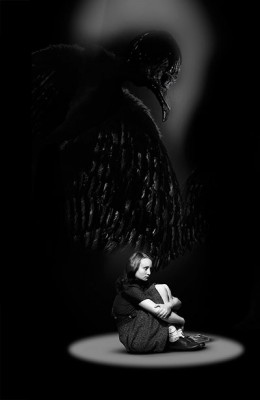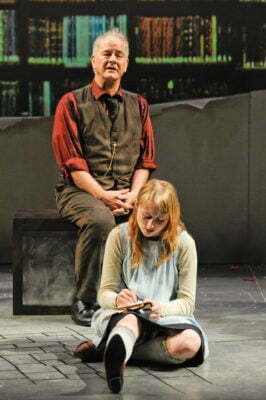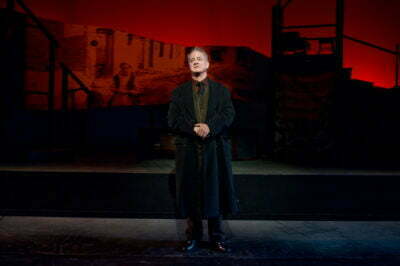The Book Thief
Based on the novel by Markus Zusak

Adapted by Heidi Stillman
Directed by Hallie Gordon
At Steppenwolf Upstairs Theatre, Chicago
“I am haunted by humans” – Death from The Book Thief
Slow pace and often wordy narration hurts The Book Thief
In their Steppenwolf for Young Adults series, Heidi Stillman’s adaptation of the 2006 novel by Markys Zusak captures the essence of life during the World War II Era in Germany. The production, directed by Halle Gordon, misses several opportunities to impact audiences stronger that it actually does. The use of Death (the empathic Francis Guinan) as the narrator dilutes the flow of the story and slows the pace of the show. Also, as adapted by Heidi Stillman, several of Death’s speeches are vague and philosophically dense rendering unneeded complexity to the story, especially for the teenage audience the production aids toward.

The poor, sparse set design (by Lizzie Brachen) depends on the video projections (by Mike Tutaj) but the small, jagged screen only uses a small portion of the large backdrop. Why? In many of the scenes, one could hardly see the buildings or the crowd scenes. A missed opportunity. The uneven pacing further depleted the emotional impact of several scenes. The long first act, dragged on. The lesson of a fast-paced 85-90 minute one act works for teen audiences seems to have been abandoned.

Yet, there is much to admire in The Book Thief. Rae Gray, as Leisel Meninger (the Book Thief) leads a n ensemble of fine actors committed to the work. Leisel is a young girl struggling to survive in rural Molching, Germany. Her life is filled with risk, danger, and destruction; her solace comes from reading and the love from her stepfather Hans Huberman (Mark Ulrich) and he friend Rudy (Clancy McCartney). Death also watches over Leisel as he is fascinated by humankind’s will to live. When Hans hides the Jewish son of his WWI friend, Leisel both learns how to keep a secret and how to befriend a fellow sufferer.
In act two, we see how the Allied bombing of German cities terrorized the civilian population giving death much work. The play gradually depicts the terrible cost of violence as it moves from bearing witness to compassion and complicity. The novelist and the adapter both missed a golden opportunity to convey a moral lesson when a group of enslaved Jews were marched through Molching on their way to Dachau concentration camp. No outcry came from the so-call good citizens of Molching, Germany; only Hans offered a piece of bread to Max, the man he hid .
The Book Thief eventually becomes powerful but it sure could have been a stronger lesson about the foible of humanity. But it sure give fruit to the axiom: “When Death tells a story, you listen.” I hope the teen audiences will realize the moral lessons demonstrated here.
Recommended
Tom Williams
Talk Theatre in Chicago podcast
Date Reviewed: October 20, 2102
At Steppenwolf’s Upstairs Theatre. 1650 N. Halsted, Chicago, IL, call 312-335-1650, student performances are sold out, tickets $15- $20, www.steppenwolf.org, added performances for the public on November 10 at 3 & 7:30 pm, November 11 at 3 pm, running time is 2 hours, 15 minutes with intermission, through November 11, 2012
